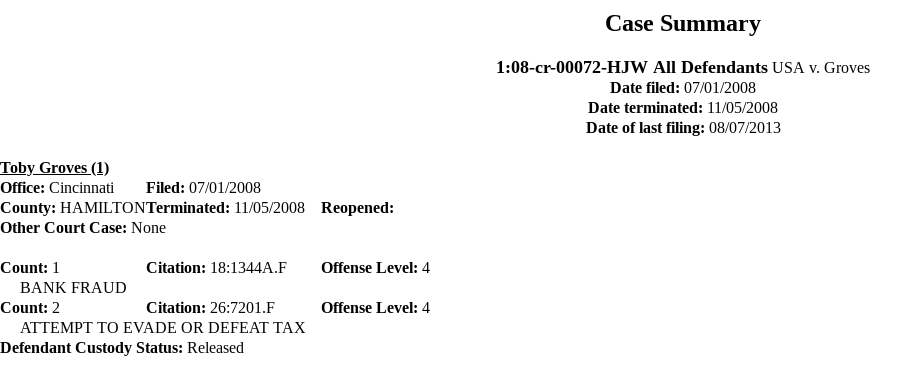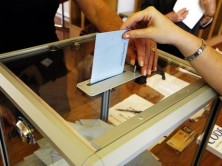
(Credit: Flickr/James Cridland)
What do you do when the correction is wrong? Or when you have problems with the public editor’s response?
A man who pleaded guilty to bank fraud, Toby Groves, has spent the past couple of months trying to find the answers to those questions and get NPR’s and a blogger’s claims about him corrected.
iMediaEthics got involved because, last year, we wrote about the public editor’s column and the corrections. Groves contacted us to complain about our article, since it cited the NPR public editor Elizabeth Jensen and blogger. Since then we’ve heard from Groves several times as he has pursued corrections from NPR and a retraction from the blogger. Because of this, iMediaEthics has a unique insight into the complaints and NPR’s changes, which include NPR updating its corrections twice.
The story is complicated and certainly unique. iMediaEthics cannot think of a case where a public editor’s work has been revised like this. NPR even agreed to de-index Jensen’s blogpost about Groves, Groves told iMediaEthics. While NPR and Jensen declined to comment about the case to iMediaEthics, Google searches for Groves on NPR or quotes from Jensen’s column do not produce Jensen’s column anymore, indicating NPR did in fact agree to de-index the piece. (A few links to republications of Jensen’s column do appear though.)
The Backstory
Groves, now a researcher, speaker and transparency advocate, pleaded guilty and was sentenced in 2008 for bank fraud and tax evasion. He had owned a mortgage brokerage company and, after realizing his business needed money, lied on a mortgage loan application, starting a series of events that ultimately ended in his confession, plea and sentencing.
Back in 2011, NPR heard of his case and contacted him to discuss what went wrong. Groves agreed to interviews with NPR about his crime, which NPR ended up reporting on in a 2012 podcast and report called, “Psychology of Fraud: Why Good People Do Bad Things.” Groves had no major problems with how NPR handled that report, praising to iMediaEthics the abilities of the journalists he interacted with.
But then.
A Washington man named Paul Vanderveen published numerous blogposts about the NPR “Psychology of Fraud” report, alleging significant errors by NPR. He sent his 13,000-word essay to NPR and NPR published corrections, citing Vanderveen’s writing. NPR’s public editor Elizabeth Jensen also published a blogpost critical of NPR’s journalists for not being skeptical enough and making mistakes. She also cited Vanderveen extensively. iMediaEthics then wrote our own short article about the NPR corrections and Jensen’s post.
Problem is, the corrections weren’t correct. “The journalists were right [in the original story] and the [2018] fact checking was wrong,” Groves told iMediaEthics. Specifically, he argued the correction made him look worse by indicating he gave false information about his past. And, he was upset NPR relied on Vanderveen’s blog posts, which erred.
Why? In a nutshell, the most significant issue with the correction wrongly indicated there was a separate, second criminal case beyond the bank fraud, which concerned tax evasion.
Groves had admitted bank fraud. But, as part of the plea deal, he pleaded to tax evasion for prior years — not a separate criminal case, but instead something that came into play retroactively to accompany the bank fraud.

Groves told iMediaEthics he didn’t know how the error could have occurred. However, he indicated that one problem arose when the blogger, Vanderveen, and NPR public editor Jensen apparently compared his plea agreement to the information he gave reporters. Groves said that, for the original 2012 story, he provided NPR’s reporters with the real backstory of his crime and not just the details that were in the public record.
The 2018 correction also corrected when Groves’ first “bad act” occurred — the original article called his 2004 mortgage loan application his first bad act, a distinction that NPR had selected. The correction in 2018 indicated that date was wrong and pointed to the IRS tax evasion plea.
In addition to the fact of the errors in the correction, Groves told iMediaEthics he was concerned that the corrections and public editor column harmed his credibility as a speaker because he thought it made him look like he gave false information to NPR.
Groves also said he was blindsided by the corrections and was surprised NPR didn’t contact him to verify or ask for explanation before posting corrections about his case. Groves heard only from NPR standards editor Mark Memmott in a brief call asking a few questions but he didn’t know NPR was posting corrections, Groves said.
Timeline:
- 2008: Groves pleads guilty, is sentenced
- 2012: NPR publishes “Psychology of Fraud”
- 2018: NPR published correction and Jensen’s blogpost citing Paul Vanderveen’s blogpost about Groves
- May 2019 Groves publishes blogpost challenging NPR corrections (now de-indexed)
- June 2019: NPR corrects correction and Jensen’s blogpost; Vanderveen’s essay apparently deleted
- July 2019: NPR updates correction again, de-indexes Jensen’s blogpost and linking to Groves’ explanation blogpost
After complaining to NPR, speaking with NPR’s legal department and publishing his own blogpost responding to the NPR corrections and public editor column, NPR ended up rewriting part of Jensen’s column, removing some of the references to Vanderveen, and updating the corrections it published in 2018. Groves also sent complaints to Vanderveen, who has removed his 13,000-word essay about Groves.
He again complained to NPR and finally, nearly two months after his May blogpost laying out his problems with NPR, NPR has updated its corrections and Jensen’s column again, changing the correction text and linking to Groves’ blogpost explaining the timeline and tax return issue.
Significantly, Grove said NPR agreed to de-index Jensen’s public editor column from search engines, effectively making it impossible for any reader to find her column unless they have a direct link. In exchange, Groves agreed to de-index his late May blogpost critical of NPR, he told iMediaEthics. “All the content I was unhappy with is now gone and instead linked to an explanation,” he said, telling iMediaEthics he was “pretty happy” with NPR’s resolution.
The Corrections
For posterity, iMediaEthics has published the various versions of NPR’s corrections to document the changes since they all do not live on NPR’s website anymore.
The original 2018 NPR correction read:
In this story, we refer to Toby Groves’ lie in 2004 on his mortgage loan application as “his first bad act.” We should have noted that according to court records, Groves admitted that he began the “scheme” to defraud banks “on or about June 30, 2003.” In addition, court records show he admitted to owing the federal Internal Revenue Service $299,997 for claims made about the tax years 2001-2003.
Also in this story, Groves discusses what he sees as a key moment in his life — his brother’s 1986 bank fraud conviction. Groves describes what he says was his father’s anguish over a front-page newspaper story. Our Web coverage includes illustrations that make it appear as if a photo of Groves’ brother was on the front page and that the family’s name was in the headline. But archives show that the Cincinnati Enquirer‘s coverage did not include a front-page image of Groves’ brother. The family’s name was not in the headline. Instead, the brother’s name appeared inside the newspaper.
The details about others in this report — including researchers Lamar Pierce, Francesca Gino and Ann Tenbrunsel — are not in question.
The blog Paul Vanderveen’s Attitude of Reciprocity drew NPR’s attention back to this story.”
Then, in late June, NPR corrected its correction to read:
“In this story, we refer to Toby Groves’ lie in 2004 on his mortgage loan application as “his first bad act.” We should have noted that according to court records, Groves admitted that he began the “scheme” to defraud banks “on or about June 20, 2003.” In addition, court records show he was ordered to pay the federal Internal Revenue Service $299,997 after pleading guilty to tax evasion as part of the fraud scheme.
“Also in this story, Groves discusses what he sees as a key moment in his life — his brother’s 1986 bank fraud conviction. Groves describes what he says was his father’s anguish over a front-page newspaper story. Our Web coverage includes illustrations that make it appear as if a photo of Groves’ brother was on the front page and that the family’s name was in the headline. But archives show that the Cincinnati Enquirer‘s coverage did not include a front-page image of Groves’ brother. The family’s name was not in the headline. Instead, the brother’s name appeared inside the newspaper. The illustrations also showed a fictional newspaper with a front-page headline reading “Toby Groves Found Guilty Of Bank Fraud.” To be clear, Groves’ guilty plea was never front-page news.
The details about others in this report — including researchers Lamar Pierce, Francesca Gino and Ann Tenbrunsel — are not in question.
“Update on June 27, 2019: This correction has been edited to note that court records show Groves admitted he began the “scheme” to defraud banks “on or about June 20, 2003,” not June 30, 2003. Also, it has been edited to make clear that he was ordered to pay $299,977 to the Internal Revenue Service and to clarify that the illustration of a fictional “Daily Paper” with the headline “Toby Groves Found Guilty Of Bank Fraud” does not depict an actual front page.”
iMediaEthics compared the new correction with the original Feb. 14, 2018 one.
The changes made, in addition to the update dated June 27, are:
- the 2018 correction line “court records show he admitted to owing the federal Internal Revenue Service $299,997 for claims made about the tax years 2001-2003.” was changed to: “In addition, court records show he was ordered to pay the federal Internal Revenue Service $299,997 after pleading guilty to tax evasion as part of the fraud scheme.”
- NPR added: “The illustrations also showed a fictional newspaper with a front-page headline reading ‘Toby Groves Found Guilty Of Bank Fraud.’ To be clear, Groves’ guilty plea was never front-page news.”
- NPR also deleted the line crediting and linking to Vanderveen.
As such, the new NPR correction reflects that the IRS payments were part of a plea and that they were part of the “fraud scheme.” NPR also published an update on Jensen’s blogpost that deleted information they couldn’t substantiate, and updated with the changes in the correction and the fact there was only one case. It reads:
“Updated June 27, 2019: This column has been revised to reflect changes to the correction on the initial story, and to remove material that has not been independently substantiated. To be clear, if it wasn’t from some of the previously included materials, there was only one criminal case against Toby Groves — with two charges — that concluded in a guilty plea and sentencing in 2008, as reported in the story.”
In late July, NPR again updated its correction, adding a link to Groves and saying:
Update on July 22, 2019: Under the headline “The Psychology of Fraud with Toby Groves, Ph.D. — Story Clarification,” Groves writes about how this story has become a “popular case study for professionals and researchers alike in the areas of ethics and decision-making.” And he offers an explanation for “why the 2004 date would be used to start the story and be identified as the ‘first lie.’ ”
NPR also updated Jensen’s column, which notes in the text that her column was “based on” the 2018 NPR correction. “Now we are once again taking another look back and this column has been updated,” Jensen’s column currently reads. The column now says that “some” of Vanderveen’s claims are in question or unverified so NPR removed them.
“Since the correction and the column were published, we’ve realized that while Vanderveen raised good questions, some assertions he made are disputable or have not been independently substantiated. We have removed them from the column. That said, what isn’t in dispute is that NPR could have done a better job fact-checking or explaining the facts of at least two elements of the story.”
Jensen’s column notes now that “NPR didn’t explain [Groves’] story well enough” when it decide to call a “particular date in the timeline of his story as the ‘first lie.'” She continued, “The court records, however, included allegations from prosecutors that some of his actions that led to the prosecution pre-dated the date chosen by the reporters.”
At the top of Jensen’s column is a June 27 update reading:
“Updated June 27, 2019: This column has been revised to reflect changes to the correction on the initial story, and to remove material that has not been independently substantiated. To be clear, if it wasn’t from some of the previously included materials, there was only one criminal case against Toby Groves — with two charges — that concluded in a guilty plea and sentencing in 2008, as reported in the story.”
Vanderveen
Vanderveen’s blogposts on his own site triggered the 2018 NPR review of the original 2012 article and corrections.
While Vanderveen has deleted some of the posts, including the 13,000-word essay, he hasn’t posted a retraction or any other statement. Vanderveen’s attorneys are in talks with Groves, who wants a financial settlement and for Vanderveen to stop writing about him. “Mr. Groves did contact me regarding my essay, and my attorneys are currently discussing the matter with him,” Vanderveen told iMediaEthics in mid-July. When asked for an update, he said, “This may take time to resolve, so I’m going to decline to make any further comment at present.”






